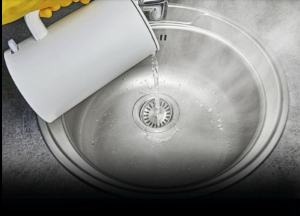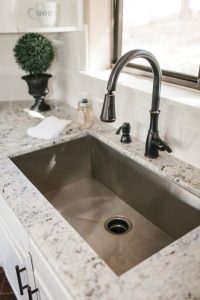This duty comes easily to a lot of us.
After boiling pasta or draining potatoes, we take the pot and proceed right to the kitchen sink. We don’t even think about it when we pour hot water down the drain. It looks secure and even helpful. After all, hot water should work to get rid of fat, right?
Not really.
This normal habit could be damaging your plumbing without you even knowing it, which could mean expensive repairs that you didn’t see coming. You should think about this choice again, whether you’ve been a homeowner for a long time or are moving into a nice retirement home.

A terrible habit that might hurt your home
We all want our kitchens to work well. But a lot of people don’t aware that putting boiling water down the sink can seriously hurt your plumbing, especially if your pipes are made of materials that weren’t meant to handle high temperatures.
Most homes’ plumbing systems today employ PVC (plastic) pipes because they are affordable, reliable, and function well for everyday water consumption. But even the best materials can’t do everything.
What Happens When You Put Hot Water in the Sink?
Let’s take a look at what’s really happening when that hot water hits your sink:
1. It shortens the life of your pipes.
PVC and other common drainpipe materials can usually withstand warm water. But what happens when the water you boil for cooking becomes as hot as 200°F/93°C? That’s a lot.
Pipes can get weaker from being exposed to high heat again and over again, especially around the joints where they are most susceptible to break. Pipes that are supposed to last 30 to 50 years could break decades early, which would cause leaks and maintenance costs that you didn’t see coming.
2. It causes pipes to flex and break.
When it comes to heat, PVC pipes aren’t as sturdy as metal pipes. If you pour hot water down the pipes a lot, they can stretch, soften, or break.
That means you can have leaks behind walls, under cabinets, or under floors that you don’t see until they get a lot worse.
“But doesn’t hot water help keep grease from building up?”
This is one of the most common mistakes people make when it comes to taking care of their kitchen sink.
Yes, hot water seems to wash away food fat and cooking oil, but it doesn’t break down grease. It doesn’t melt it all the way; it merely melts it long enough for it to move deeper into your plumbing, where it cools and hardens again, out of reach.
Over time, these fatty buildups can cause serious problems like slow drains, bad smells, and even blocked pipes that a plumber has to solve.

Here are some things you can do in the kitchen to keep your plumbing safe.
These simple things you can do can keep your kitchen sink in great shape for years to come, whether you cook a lot or only use the microwave now and then.
1. Always remove oil before washing.
Before you rinse your pots, pans, and plates, take a few minutes to wipe off any extra grease with a paper towel or napkin. Please throw away the used paper towel.
This one easy technique will help keep oil out of your pipes. It only takes a minute.
2. Use drain cleaners often, but do it safely.
Some grease and food will still get into your pipes, no matter how hard you try. That’s why it’s a good idea to clean your drains with a gentle cleanser once a month.
Look for products that are safe for PVC and can break down grease. Many drain cleaners now feature antibacterial ingredients that help get rid of smells and keep your drain clean.
Older people should look for alternatives that don’t smell unpleasant, don’t rust, and don’t need a lot of chemicals or washing. These are great for persons with arthritis or skin that is easily irritated.
A Word About Garbage Disposal
If your sink has a garbage disposal, you might think it can handle anything. But grease and hot water can still damage disposals. Grease can build up on the blades and interior surfaces, rendering them less useful and triggering future clogs.
The same suggestion works whether you have a disposal or not: keep the hot water in the pan and the grease out.

What should you do with boiling water that you don’t need anymore?
Here are some safer and more polite ways to get rid of that hot water instead of throwing it down the sink:
Let it cool off: Set the pot down and let the water cool to room temperature before you pour it out.
You can use it again: After it cools down, you can use the water from boiling vegetables to water plants outside.
If you have to empty it, do it in stages and run cold water to keep your pipes safe.
Small Changes, Big Savings
As we get older, keeping our homes in good shape is more about avoiding problems than correcting them. You don’t want to wake up to water damage under the kitchen sink or have to pay hundreds or thousands of dollars for plumbing work that could have been avoided.
Not pouring hot water down the drain is a simple and practical way to protect your home and save money over time.
It’s Not Just About Pipes—It’s About Safety
We all know that little things may add up over time, like saving a few cents every week or the damage that hot water does over time.
We exhibit love in our families every day through the meals we provide, the rituals we follow, and the time we spend together. We should also be careful with the mechanisms that keep our homes operating.
Stop for a second the next time you go to get the hot water. Let it cool off. Look after your pipes. You will be grateful to yourself later.
